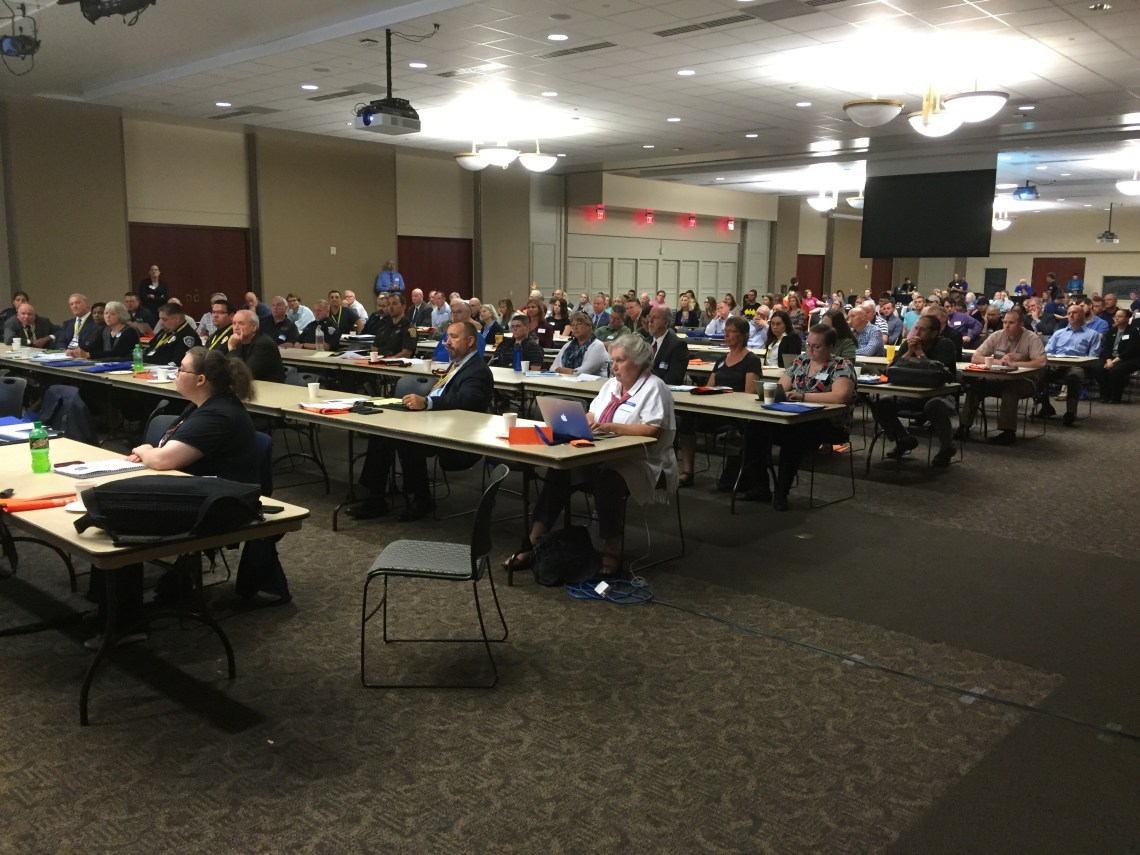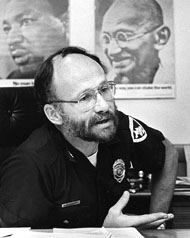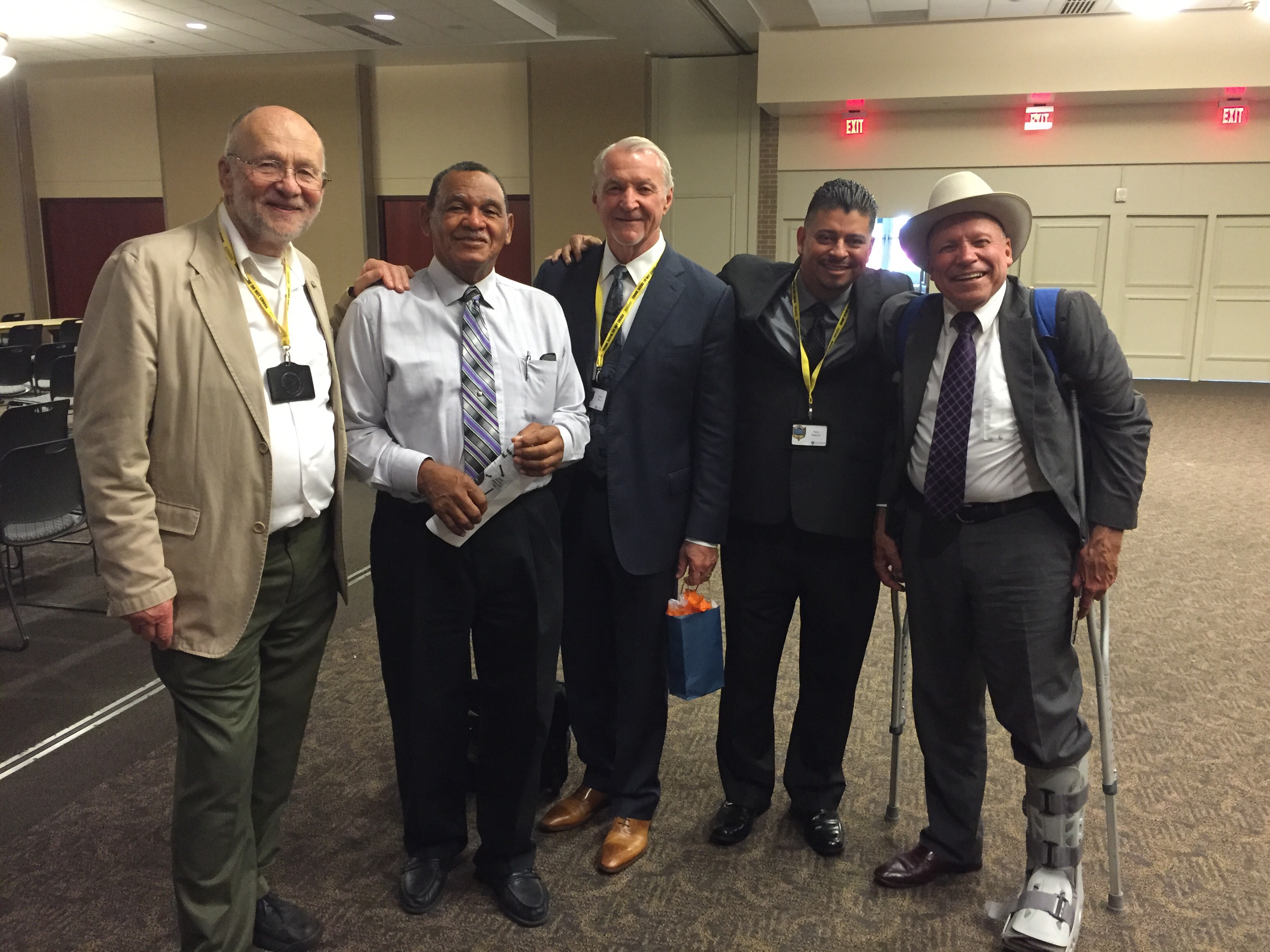 Please post your reflections and learnings from the 2nd Annual Conference on 21st Century Policing: Building Trust and Legitimacy which was held last Friday, September 16th on the campus of the University of Wisconsin – Platteville. You may post to this blog under “Comments.” Thanks for helping us plan an even better conference next year!
Please post your reflections and learnings from the 2nd Annual Conference on 21st Century Policing: Building Trust and Legitimacy which was held last Friday, September 16th on the campus of the University of Wisconsin – Platteville. You may post to this blog under “Comments.” Thanks for helping us plan an even better conference next year!
Comments From Conference Evaluation Form
What were the most useful aspects of the conference?
- Order of the speakers; the panels; breakout sessions were great;
- Panel on mental health issues; diversity of voices and topics – especially the point/counterpoint on PERF recommendations; the way police use force;
- Mental patients that are incarcerated; breakfast, lunch and other refreshments were outstanding; all speakers were outstanding;
- Chuck Wexler and Mark Bowman; integration of students in a conference for working professionals; great to see both sides of arguments throughout the day;
- A combination of speakers with diverse professional backgrounds; exposure to cutting-edge issues; hitting on the need to reform police and community relations; varied perspectives;
- Discussion from different stakeholders; Ozanne’s remarks were impressive and well-delivered; make Lt. Dan’s presentation a part of the conference – not a breakout; good microphones and room arrangement.
What should any future conference focus on?
- Wrongful convictions; training and standards; social forms to bring law enforcement and community together regularly to breach the insular peer pressure on all sides;
- Procedures and jails; current topics; contemporary issues in law enforcement; feasibility of implementation of various ideas presented; best practices in LE; cyber crimes; field training;
- Breakout groups to brainstorm solutions; how to root out racism; real things I can do in my agency; how to increase the effectiveness of community policing by encouraging the people to partner with the police;
- How to have open communication; police stress and well-being; community responsibility; citizen police academies; volunteers in police services (VIPS); fundraisers for DARE/TRIAD/k-9; how to actually implement this stuff.
Additional Email Comments:
“Most participants I talked to on all sides seemed to agree that the public is asking for Graham v. Connor to be as Executive Director Wexler said: the floor not the ceiling. In our region that is starting to become common ground to a certain extent, but how high the ceiling is will be a real negotiation. Police are very reluctant to cede the primacy of their perspective in judging appropriate use of force.” — Dr Staci Strobl, Chair, Criminal Justice Department, UW-Platteville.
“I do not feel like we really framed the discussion for the day early on. We had a very diverse audience gathered on Friday. However, depending upon the group you most aligned with (past law enforcement, current law enforcement, community member, academic or student). The concept of “21st Century Policing” can mean a lot of different things to you. After the initial opening remarks, we moved into Noble’s [Wray from the COPS Office] comments. We followed this by scheduling Chuck Wexler and Mark Bowman. All three really are flying at the 35,000 foot level if you get my thought here. Yet in the afternoon, we have Michael Bell’s very emotional presentation, and then I stayed for Sheriff Lawrence’s breakout which quite frankly everyone should have had the opportunity to hear (given he traveled all the way to Wisconsin from Utah).” – Joe Balles (Retired Capt., Madison, WI PD)
“I enjoyed the conference! It put a very personal aspect to the current policing issues, for me it put faces to police officers and people leading the community along with people who have been affected by bad policing or people who oppose the current direction the criminal justice system is going. For example, hearing Michael Bell’s story about how his son was basically executed by bad police officers made me reflect on my view of “there’s a problem with some police, but it’s just not as prevalent in Wisconsin or around my community”. The personalization made me realize that there is a bigger problem than I originally thought before going to the conference; it also made me realize that it’s not just one person’s problem but it’s everyone’s problem to get involved and to fix it. Thank you for organize a very thorough and in depth program, I really enjoyed hearing extremely knowledgeable people discuss a very important issue.” — Student, UW-Platteville Student
“I still haven’t processed all that I experienced that day. I learned a lot and felt discomfort in several of the presentations, which is a good thing. I guess the challenge I face is how we bridge the knowing – doing gap.” — Dr. Mark Bowman, Methodist University, Conference Speaker
“I felt very comfortable being in an honest, progressive environment to discuss this toxic and polarizing subject matter which has always divided us as a people. I thank you Chief Couper for ALWAYS being that consistent voice for reform. Your beautiful leadership and love for the profession has NEVER wavered. I am tremendously overjoyed to see a new paradigm shift developed to overcome the current state of violent madness, where law enforcement can truly become a trusted government institution.” — Alex Salazar, Former LAPD Officer and Breakout Session Presenter
“Last, I very much likes the statement by Dr. Mark Bowman who said, ‘You can tell what a government values by what they budget’. The idea that police agencies require less training than persons who are licensed barbers should be more widely told and explained.” Bill Grosshans, Lecturer in Criminal Justice, UW-Platteville, former head of Wisconsin state probation and parole.
See Some Conference Photos HERE.


Hello: just completed the editing of the part of conference up to lunch. I did not include the “CV” of the presenters, as I am far away at a weekend that includes the memorial service for my sister who died of suicide on the 18th of August. Grim times for my family. Will send first half in separate email; please review and correct any errors; you are free to edit as you need to for your uses. The conference was very, very impressive. Given what my family has been going through with a very complex suicide that included finding out some very serious ongoing crime on the part of my sister, the Michael Bell presentation was especially compelling and tragic to hear about. Thank you SO much. This is one of two emails. >
LikeLike
Very good program, great selection of speakers to achieve a broad perspective of opinions. Q&A was good except for one person who wanted to speak to a local situation rather unrelated to the conference. I had to leave before the breakouts, as did several other people I spoke with earlier in the day. Moving breakouts up earlier would have helped some of us, General rule for most Friday conventions/conferences I’ve gone to: schedule nothing after 3 p.m. because many will be gone. I’d have to commend the Dane County Sheriff for his presentation; the room was silent throughout his remarks because his message was the most compelling of the day.
LikeLike
Thanks, Ed. Good comments that I will bring forward.
LikeLike
I felt very comfortable being in an honest, progressive environment to discuss this toxic and polarizing subject matter which has always divided us as a people. I thank you Chief Couper for ALWAYS being that consistent voice for reform. Your beautiful leadership and love for the profession has NEVER wavered. I am tremendously overjoyed to see a new paradigm shift developed to overcome the current state of violent madness, where law enforcement can truly become a trusted government institution.
LikeLike
Alex, the pleasure was mine — you are a true advocate for justice. Keep in touch and Press On!
LikeLike
I still haven’t processed all that I experienced that day. I learned a lot and felt discomfort in several of the presentations, which is a good thing. I guess the challenge I face is how we bridge the knowing – doing gap.
LikeLike
Ah yes, such is our task. I think your point/counter point with the “30 Guidelines” was exactly the kind of dialogue we need. Thanks for coming out to the hinterland. I only wish I could have spend more time chatting with you — but this is good, too. Peace, Mark.
LikeLike
I enjoyed the conference! It put a very personal aspect to the current policing issues, for me it put faces to police officers and people leading the community along with people who have been affected by bad policing or people who oppose the current direction the criminal justice system is going. For example, hearing Michael Bell’s story about how his son was basically executed by bad police officers made me reflect on my view of “there’s a problem with some police, but it’s just not as prevalent in Wisconsin or around my community”. The personalization made me realize that there is a bigger problem than I originally thought before going to the conference; it also made me realize that it’s not just one person’s problem but it’s everyone’s problem to get involved and to fix it. Thank you for organize a very thorough and in depth program, I really enjoyed hearing extremely knowledgeable people discuss a very important issue.
LikeLike
Brian, thanks for the insightful comments! See you in class!
LikeLike
Reblogged this on Improving Police and commented:
Some recent updates on feedback from conference attendees.
LikeLike
I was extremely excited to see so many professionals, students, and community members take the time out to listen and discuss such important issues. Simply stated, wishing concerns away and/or walking around with blinders will not move us forward as a nation. We need to continue to have these conversations and we need to focus on being solution focused. Thanks to everyone who assisted with planning the conference, those who provided insight, and those who filled the chairs! These are steps in the right direction!
LikeLike